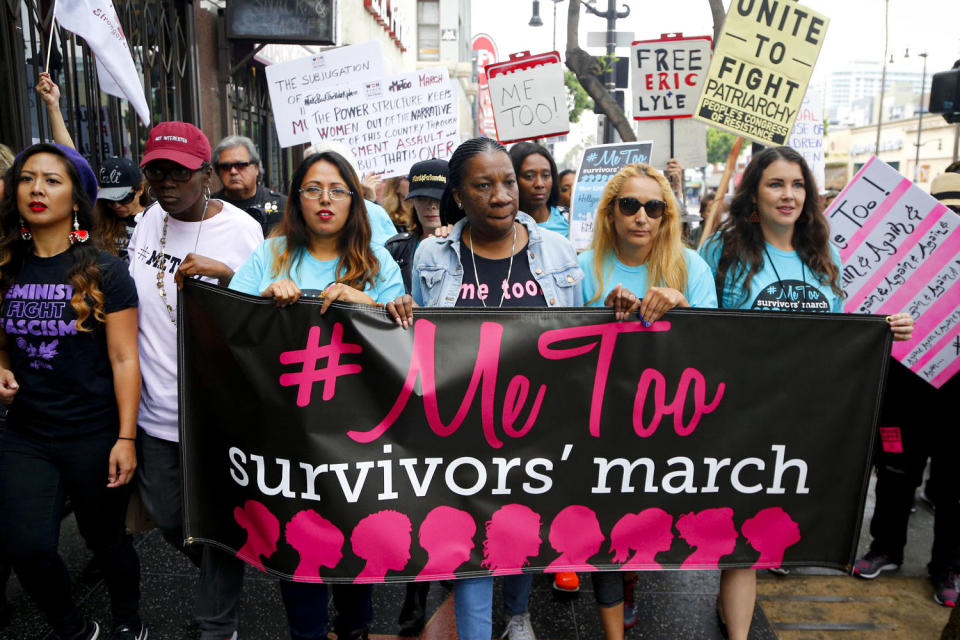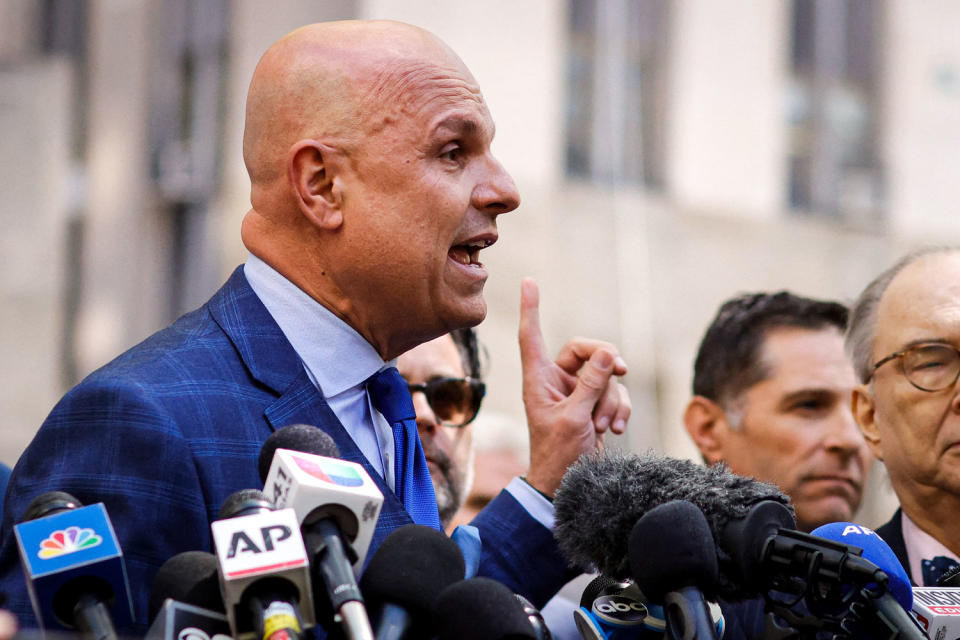'We've come too far': Weinstein's overturned rape conviction won't stop #MeToo movement, advocates say
A day after learning that Harvey Weinstein's 2020 rape conviction was overturned by New York's highest court, one of the women whose testimony was at the heart of his trial said she was "sick to my stomach."
But Mimi Haley, a former TV and film production assistant, said Friday that she has no regrets about confronting Weinstein, the once-power Hollywood mogul, in such a public setting, and would "consider" retestifying if prosecutors press for a new trial. She declined to say for certain, adding that the preparation for the first one was daunting.
"While this is a setback, it will not undo the leaps forward we have made," she told reporters, "and it will never undo the truth."
Despite the 4-3 decision Thursday by the New York Court of Appeals to overturn Weinstein's conviction, those who have been firmly fixed in the #MeToo movement — sexual assault survivors and their advocates and legal representatives — say holding those in positions of power accountable will not, and should not, change.
"I think there's been such a seismic shift on how survivors use their voices. I don't think it’s going to shame or shut survivors down into silence," said Elizabeth Fegan, a Chicago lawyer who has represented women who have accused Weinstein of sexual abuse in civil litigation.

"Will people think twice about participating in a criminal trial? Absolutely," she said of the appeals court's decision. "But will it return us to the era before the #MeToo movement? No way. We've come too far."
Weinstein, 72, was sentenced to 23 years in prison on the New York conviction and remains upstate behind bars. He will not be released after being found guilty in a separate rape case in Los Angeles in 2022. He has filed a notice to appeal that verdict as well.
His conviction in New York of forcibly performing oral sex on Haley in 2006 and of rape in the third degree for an attack on another woman, an aspiring actress, in 2013 had been hailed as a landmark outcome — symbolizing how accusers could band together and call attention to sexual assault and harassment by prominent men and public figures in a multitude of industries.
The appeals court, however, found that the trial judge had erred by allowing additional witnesses to testify even though their allegations were not part of the actual charges against Weinstein. Prosecutors had asked to permit their testimonies in order to show a larger pattern of Weinstein's alleged behavior.
The majority of judges wrote that the supplementary testimony, meant to speak to Weinstein's character, was "highly prejudicial" against him, although they disagreed with his defense's appeal on other issues.
Dawn Dunning, a former actress who testified at Weinstein's trial to give corroborating evidence of alleged sexual assault, said in a statement that she wants the Manhattan district attorney's office to retry the case.
"The culture has changed," Dunning said, "and I am confident that there is no going back."
But Weinstein's lawyer, Arthur Aidala, said the decision was a "victory" for his client and "every criminal defendant in the United States of America."
A spokesperson for the Manhattan district attorney's office said it "will do everything in our power to retry this case, and remain steadfast in our commitment to survivors of sexual assault."
The focus on Weinstein followed Bill Cosby's conviction in 2018 on three felony counts of aggravated indecent assault from a 2004 incident. But in 2021, the comedian's conviction was overturned based on a technicality related to a previous prosecutor's promise not to charge Cosby, and he was freed from a Pennsylvania prison after serving three years of a three- to 10-year sentence.
In both the Cosby and Weinstein cases, survivor advocates have noted that none of the accusers had their credibility called into question as part of the reasons the courts overturned the convictions.
Many in the wider movement pledged to forge ahead and continue speaking out.
"Moments like this underscore why movements are necessary," Tarana Burke, the founder of #MeToo, told reporters. "Almost seven years ago, because these brave women in this case broke their silence, millions and millions and millions of others found the strength to come forward and do the same. That will always be the victory."

Scott Berkowitz, president of the Rape, Abuse and Incest National Network, or RAINN, which operates the National Sexual Assault Hotline, agreed that no matter what the courts decide, they can't take away from how public sentiment has been on the side of the dozens of women who have accused Weinstein of sexual assault, abuse and rape. But, he said, it's still too early to say if the latest decision will have an impact on reporting rates.
There is typically an uptick in calls to the hotline and visitors to the organization's website following coverage of these high-profile cases, he added.
"It's natural to look at a decision like this and feel deflated," Berkowitz said. "I worry that anything that makes it harder to come forward to attain justice will discourage someone from reporting. But I hope any effect will be brief."
However, that Weinstein isn't able to walk out of prison in the same way that Cosby did may "soften the blow" of his successful appeal, Berkowitz said.
"A lot of the progress we make on this issue is two steps forward and one step back. But in these moments," Berkowitz said, "it can fire up survivors and make them want to stand up to prove that justice can be obtained."
Lawyer Gloria Allred, who represents Haley and other Weinstein accusers, said she is also concerned about what message the appeals court's decision will send to sexual assault survivors, as well as to prosecutors if they don't believe they can win, "especially in high-profile cases against the rich, the famous, the powerful, the well-connected defendants."
"Then there will be not only no access to justice for the #MeToo witnesses, but in addition, for the actual victim of the crime where that crime is within the statute of limitations," Allred told reporters Friday.
This article was originally published on NBCNews.com
